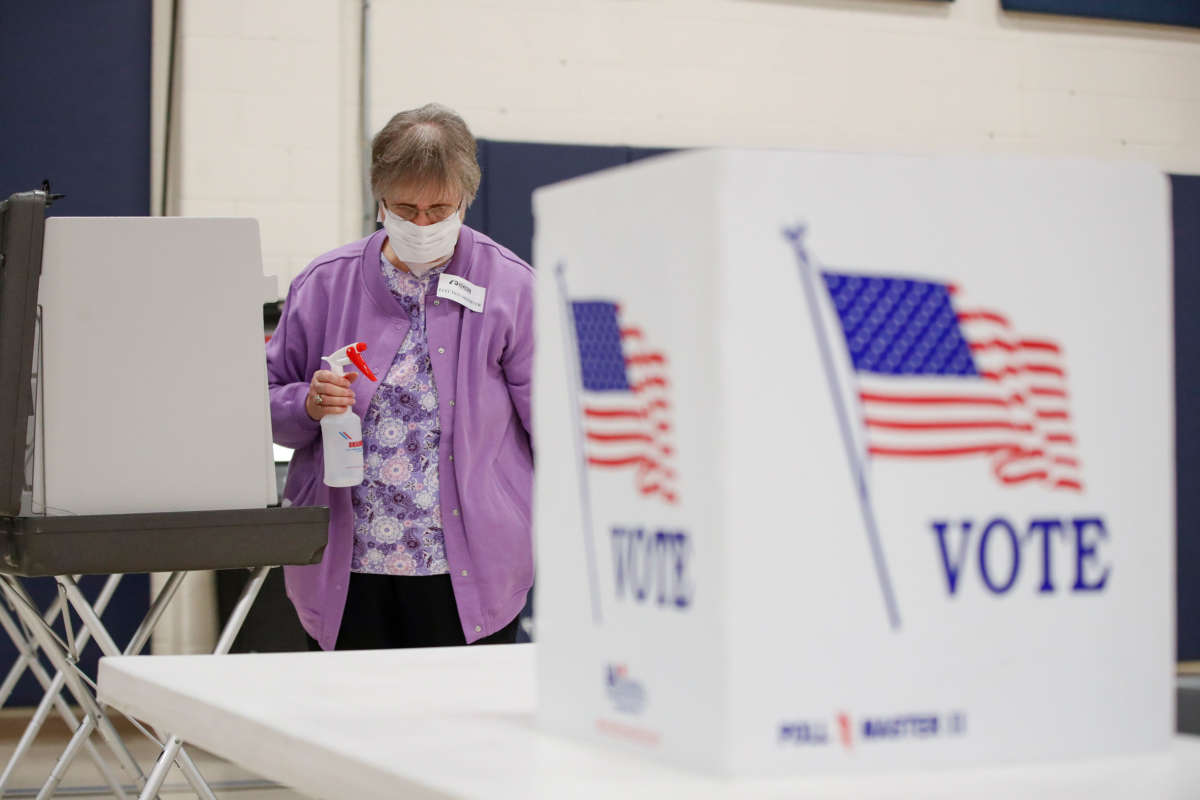Part of the Series
Despair and Disparity: The Uneven Burdens of COVID-19
In spite of coronavirus fears gripping the country, Wisconsin is ultimately moving forward with in-person voting on Tuesday.
Democratic Gov. Tony Evers made several attempts over the last several days to delay the spring elections in order to find an alternative to in-person voting during the COVID-19 pandemic.
Instead, Republican lawmakers, the conservative state Supreme Court and the U.S. Supreme Court itself have all acted in ways that will either cause the virus to spread or disenfranchise thousands of voters who are too fearful of going to the polls, with a high probability that both outcomes will happen to some degree.
Evers announced last Friday that he would call a special session of the Republican-led state legislature to meet over the weekend. The governor wanted lawmakers to consider postponing the election until mid-May, and create an in-mail-only voting process to address voters’ fears of contracting COVID-19, but Republicans adjourned the session within a matter of minutes on Saturday without taking up the issue.
On Monday, Evers announced that he would issue an executive order delaying the election until June. Republicans appealed his order in an emergency meeting of the state Supreme Court, which has a conservative majority. The court sided with the Republican Party’s view by a 4-2 vote, with one conservative justice abstaining as he himself is up for re-election in the spring.
Polls open in minutes. Here’s a look at the line in Waukesha, the city’s only polling location pic.twitter.com/Uqg08gannt
— Matt Smith (@mattsmith_news) April 7, 2020
As if those events weren’t enough, the U.S. Supreme Court also issued a ruling on absentee ballots that has the potential to disenfranchise tens of thousands of voters.
A lower court ruled last week that the deadline for mailing in absentee ballots, some that were sent late to voters due to issues with the pandemic, would be extended several days beyond election day, but the Supreme Court, in a 5-4 decision, overturned that ruling on Monday. Justice Ruth Bader Ginsburg, in her dissent, said that the decision “will result in massive disenfranchisement” of Wisconsin voters. Now, absentee ballots must be postmarked no later than election day in order to be counted.
But there are other problems with absentee ballots as well, as one voter explained.
Max Miller, a resident of a suburban community just minutes outside of Wisconsin’s capital city of Madison, explained how the absentee ballot process proved difficult for him and his loved ones.
“My family and I have been in isolation since March 15, working from home and only going out twice for groceries since then,” the Fitchburg, Wisconsin, resident told Truthout. “My wife and I have been married for three years, but she hasn’t received her citizenship yet. We have a 5-month-old baby, and my wife’s mother, who is part of the ‘high risk’ group of people for coronavirus, is staying with us right now.”
“I thought I had no problem voting absentee [while] living with two adults, but only once you look at the ballot envelope itself do you realize you need ‘citizen witnesses’ to confirm your vote,” Miller added.
All absentee ballots in Wisconsin require a witness signature, but Miller said at no point in any literature he read was it stipulated that a citizen had to be the signer.
“I responsibly ordered an absentee ballot because of the pandemic, but now I still have to add increased risk by having someone else witness and sign my ballot,” Miller explained.
In-person voting is viewed by many in the state at the moment as dangerous and risky due to the coronavirus pandemic. The matter is further compounded by the fact that many polling places are closed in communities across the state, reducing areas where citizens can vote — including Wisconsin’s largest city, Milwaukee, where 180 voting locations have been downgraded to just five in-person places to vote and five “drive-thru” ballot drop-off areas for a city of nearly 600,000 residents.
There are two statewide races being decided in Wisconsin on Tuesday — the Democratic Party’s primary contest between former Vice President Joe Biden and Sen. Bernie Sanders, and a state Supreme Court race between a conservative incumbent and a liberal-leaning challenger. In the latter race, a disenfranchised electorate in Milwaukee, which typically leans Democratic in its voting patterns, would benefit a right-leaning candidate.
In addition to statewide contests, thousands of down-ballot races are set to take place in Wisconsin on Tuesday.
On his Twitter account on Monday evening, Sanders blasted the decision to keep the elections scheduled for Tuesday.
It's outrageous that the Republican legislative leaders and the conservative majority on the Supreme Court in Wisconsin are willing to risk the health and safety of many thousands of Wisconsin voters tomorrow for their own political gain. https://t.co/Ut5ZQVBqhB
— Bernie Sanders (@BernieSanders) April 7, 2020
“It’s outrageous that the Republican legislative leaders and the conservative majority on the Supreme Court in Wisconsin are willing to risk the health and safety of many thousands of Wisconsin voters tomorrow for their own political gain,” he wrote.
